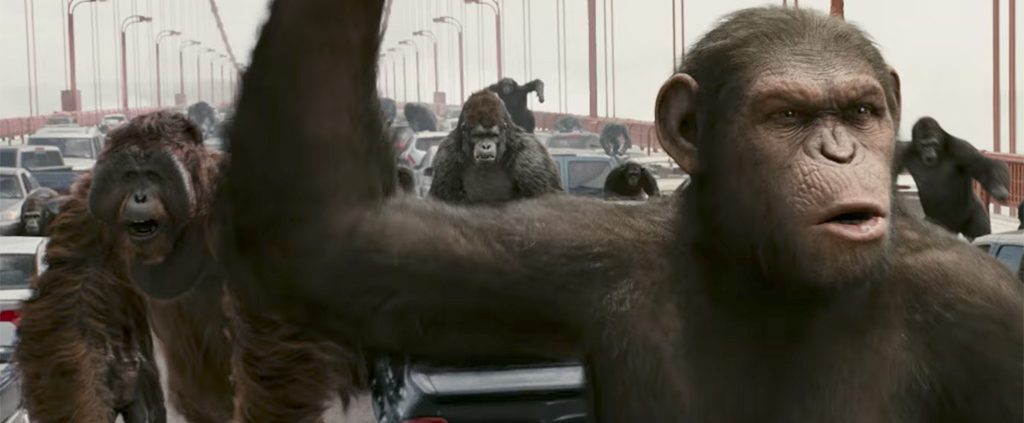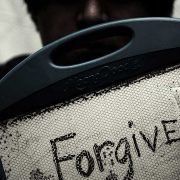War for the Planet of the Apes: Forgiveness and the Darkness Within
Rating: 4 out of 5 stars
![]()
![]()
![]()
![]()
![]()
![]()
![]()
![]()
![]()
![]()
![]()
![]()
![]()
![]()
![]()
![]()
Photo taken from Official Trailer
Written By Simon Moetara, New Zealand
It’s the third instalment of the critically acclaimed series and it’s epic—an epic showdown between man and ape, that is.
For the uninitiated, here’s how it all began.
In the first film of the series, “Rise of the Planet of the Apes” (2011), an experimental drug intended for curing Alzheimer’s disease is tested on chimpanzees. It ends up increasing the intelligence of Caesar (Andy Serkis), a chimpanzee raised by a young doctor. Caesar releases the chemical into other apes, which makes them smarter. But it results in a “simian flu” that causes the deaths of the majority of the human population.
In the second instalment, “Dawn of the Planet of the Apes” (2014), Koba, an ape who suffered torture and experimentation at the hands of humans in a research facility, rebels against Caesar’s leadership and starts a war with humanity. The human settlement sends a radio call for help that is picked by an army base, resulting in a large-scale military engagement with the apes that lasts for two years, bringing us to “War of the Planet of the Apes” (2017).
[WARNING: Spoilers ahead] Forgiveness, mercy, and redemption are major themes in the third film. Early on, Caesar returns four survivors from a human attack in a show of mercy. He just wants the apes left alone in the forest. Caesar recalls that Koba could not forgive humans for his suffering, and could not let go of the darkness inside. However, things take a turn for the worse when he encounters the Colonel (Woody Harrelson).
The Colonel is a man who has eradicated mercy. The latest effect of the simian flu is the loss of human speech, and the Colonel kills anyone who manifests this symptom or who disagrees with his ruthless approach. He has even killed his own son. Harrelson, in camouflage paint and shaven head, reminds one of Marlon Brando’s Kurtz in Francis Ford Coppola’s epic war film Apocalypse Now (1979), with his cruel atrocities conducted in the name of war and his refusal to answer to higher military command. When he kills Caesar’s wife and son, the primate leader chooses the way of revenge over leading his troop to safer surroundings. Having now suffered terribly himself, Caesar refuses to walk his talk. Can he overcome this journey into his own heart of darkness?
Maurice, a former circus orangutan who serves as Caesar’s advisor and conscience throughout the series, challenges Caesar and at one point, saying, “You sound like Koba.” Later, when Caesar is captured along with the other apes and is rejected by his colony for his lack of leadership, a young chimpanzee, Lake, implores him, “Forgive them. They’ve been through so much.”
The battle rages within Caesar. Before the tale ends, Caesar will face his ultimate test in confronting the Colonel; will he seek an eye for an eye, or will he find within himself—once again—the capacity for mercy?
One reviewer has described director Matt Reeves as having created “a pseudo-Biblical epic shot through with apocalyptic fervor”, with the old world in its death throes as a new order rises. The Exodus motif is clear through the film. A safe and good land has been found “across a desert”, according to the positive report of two scouts, and the apes are freed from oppression and slavery and led to the new and “promised” land.
The question is, will Caesar be able to let go of the hatred that darkened Koba’s heart, and enter the land with his people? Or will he, like Moses, fail to enter the land of promise, seeing it only from a distance?
In his classic book Mere Christianity, Christian writer and apologist C. S. Lewis writes, “Everyone says forgiveness is a lovely idea, until they have something to forgive.” Yet, as hard as it can be, forgiveness is central to the life to which we are called to in Christ.
Forgiveness lies at the heart of our Christian faith. We ask God for forgiveness, as we forgive those who have sinned against us (Luke 11:4). The most common Greek word in the New Testament that is translated as “forgiveness” literally means “to release, to let go, to hurl away.” It is to pardon an offender, to choose not to demand payment for a debt. French philosopher Simone Weil said that when we forgive such debts, we give up our self-centred claims on the world. As we forgive, we can also set ourselves (and potentially the perpetrator) free from the cycle of bitterness and blame.
We also forgive because we have experienced God’s forgiveness. The apostle Paul writes, “Be kind and compassionate to one another, forgiving each other, just as in Christ God forgave you.” Counselor Dr. David Seamands concluded that the two major causes of most emotional problems among evangelical Christians are the failure to understand, receive, and live out God’s unconditional grace and forgiveness; and the failure to give out that unconditional love, forgiveness, and grace to other people. We long for grace, but so often we do not live in the reality of grace.
May the good news of the gospel saturate us so that we become a people of grace in a world of un-grace, and so glorify our Father in heaven.










“Everyone says forgiveness is a lovely idea, until they have something to forgive.” – Very very true the art of forgiveness is something to be learned over time and through practice. Something that I would like to work on and softening my heart to others,this quote has challenged me in that
A lesson for all of us indeed. Thanks for commenting Ruby!